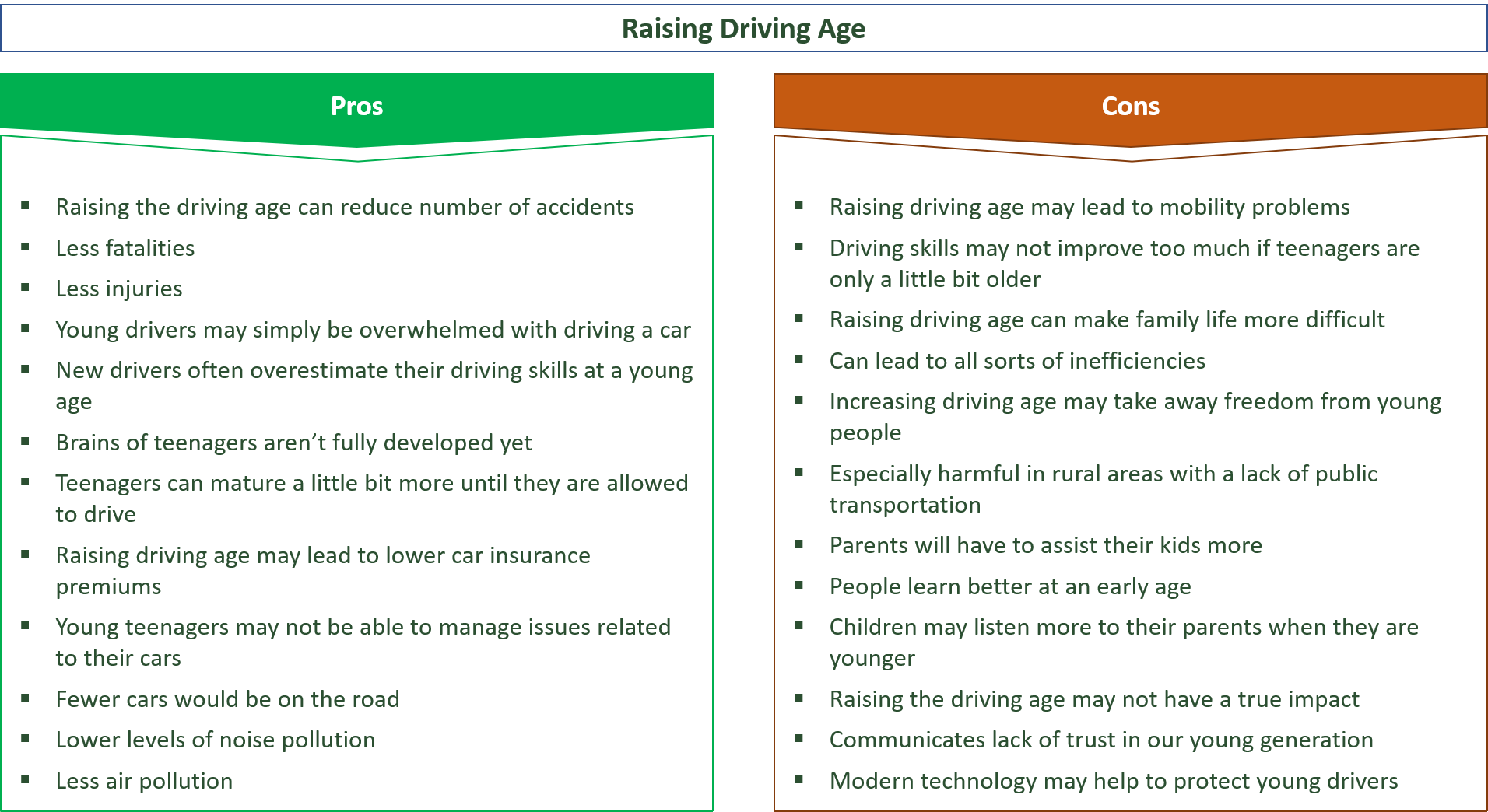“Age doesn’t affect driving – how do you like that?”
Mario Andretti, Driver
Pros and Cons of Raising the Driving Age

Raising the driving age is a rather controversial topic in many countries all over the world.
In some countries, children are already allowed to drive at the age of 16 or even 14.
There are ongoing discussions regarding whether countries should raise driving ages in order to reduce accidents or not.
While there are many advantages of raising the driving age, there are still also many issues related to this proposal.
The pros and cons of raising the driving age are discussed in the following.
Audio Lesson
Contents
Advantages of Raising the Driving Age
- Raising the driving age can reduce number of accidents
- Fewer fatalities
- Fewer injuries
- Young drivers may simply be overwhelmed with driving a car
- New drivers often overestimate their driving skills at a young age
- Brains of teenagers aren’t fully developed yet
- Teenagers can mature a little bit more until they are allowed to drive
- Raising driving age may lead to lower car insurance premiums
- Young teenagers may not be able to manage issues related to their cars
- Fewer cars would be on the road
- Lower levels of noise pollution
- Less air pollution
- Less particle pollution
- Raising driving age can indirectly mitigate the global warming issue
- May help teenagers to exercise more
- Can increase overall fitness levels of kids
- May be a suitable measure to reduce obesity in our society
- Same minimum age for all states within a country makes quite a lot of sense
Raising the driving age can reduce number of accidents
One important advantage of raising the driving age is that it can reduce the number of accidents on our streets to a certain extent.
When children get older, they learn a little bit more responsibility and are more aware of the consequences of what they are doing.
In turn, they will often drive more responsibly and the risk for accidents may become lower on average.
Fewer fatalities
Since the risk of accidents will be lower due to an increase in driving age, also the number of fatalities that are due to car accidents may be lower as well.
Therefore, we could save many lives each year by raising the driving age, especially in countries that currently have a quite low minimum driving age and where drivers are still children.
Fewer injuries
Through a raise in the driving age, we could not only reduce the number of fatalities, we could also reduce the number of serious injuries.
In fact, in car accidents, the majority of people will survive.
However, many of them will suffer from serious injuries, which can lead to severe long-term health consequences for those people.
In turn, in order to lower the risk for injuries related to traffic accidents, raising the minimum age for driving can also help in this regard to a certain extent.
Young drivers may simply be overwhelmed with driving a car
In general, if we allow pretty young people to drive a car, chances are that many of them will simply be overwhelmed and will not exactly know what they are doing.
Consequently, not only the risk for traffic accidents will increase, also those young drivers may suffer quite a lot.
In fact, some of those young drivers may even develop serious mental issues since they will constantly feel a high level of pressure and stress.
Hence, it can also make sense to raise the driving age in order to take away some pressure from the shoulders of our young generation.
New drivers often overestimate their driving skills at a young age
The younger people are, the more likely they are to overestimate their true driving skills.
Especially if there are other young fellow passengers in the car, chances are that those young drivers want to brag and engage in risky driving maneuvers, which can lead to serious accidents.
Thus, in order to protect those kids and their fellow passengers from themselves, it can make quite a lot of sense to raise the legal driving age.
Brains of teenagers aren’t fully developed yet
Raising the driving age can also make a lot of sense since the brains of young people are still not fully developed yet.
Especially in the teen years, our brains are still not mature and we haven’t achieved our full mental potential yet.
In turn, this can lead to a state that young drivers will simply not have the mental capabilities to navigate their car through traffic in a safe manner.
By raising the driving age, we can give the brains of teenagers more time to develop and chances for serious accidents may also become lower due to that.
Teenagers can mature a little bit more until they are allowed to drive
Another benefit of raising the driving age is that we can give teenagers a little bit more time to mature and to grow in an emotional manner.
In fact, young drivers are often quite childish and want to push boundaries.
In turn, the chances that young drivers take it too far and lose control over their cars increase significantly.
Thus, by raising the driving age, we can make sure that those young drivers will be a little bit more emotionally mature when they are finally allowed to drive in a legal manner.
Raising driving age may lead to lower car insurance premiums
Since the chances for car accidents may become lower due to an increase in the legal driving age, also car insurance premiums will likely be lower as well.
Insurances always offer you premiums in line with your individual risk profile.
Consequently, if the risk for accidents becomes lower due to a raise in driving age, insurance premiums will drop as well, which can provide families with great financial relief, especially if those families already struggle to pay their bills.
Young teenagers may not be able to manage issues related to their cars
Another problem with a young driving age is that young drivers will often not be able to behave in a correct manner in case of issues related to their cars.
For instance, young drivers will often not know how to change a tire and also how to fix many other things.
In turn, in case of emergency, young drivers may not be able to fix their problems and may need additional help from their family or friends.
Thus, also in this regard, it can make quite a lot of sense to raise driving age so that young drivers will be more capable of solving their problems on their own.
Fewer cars would be on the road
Another upside of raising the driving age is that fewer cars would be on our roads.
This is just a simple math game. If we increase the driving age, young teenagers would own fewer cars and therefore, the level of congestion on our streets would be lower as well.
Moreover, commuting would become much easier and commuting times could be reduced since fewer people would get stuck in traffic jams.
Lower levels of noise pollution
If fewer cars are on the streets due to an increase in driving ages, there would also be significantly less noise pollution.
Especially in big cities, noise pollution from traffic is a big factor that greatly lowers the overall quality of life of many people.
Therefore, it can make quite a lot of sense to take measures in order to reduce the level of noise in those metropolitan areas and increasing legal driving age can be a quite effective measure to achieve this goal.
Less air pollution
With fewer cars on our streets, we can also reduce the air pollution problem to a certain extent.
In fact, cars that need fossil fuels are a significant source of air pollution and by lowering the number of cars on our streets due to increased driving age, we could also improve local air quality to a certain extent.
Less particle pollution
With lower emission levels due to a reduction in cars on our streets, there would also be far less particle pollution.
In turn, since particle pollution can lead to serious health problems, we could also improve our overall health levels by increasing the driving age, especially in big cities where particle pollution currently is a big problem.
Raising driving age can indirectly mitigate the global warming issue
Raising the driving age would also imply a reduction in harmful greenhouse gas emissions into our atmosphere since fewer cars would be on our streets.
In turn, also the global warming issue and the related adverse environmental effects could be lowered to a certain extent.
May help teenagers to exercise more
If young teenagers are no longer allowed to drive, they would have to find suitable alternatives to get around.
In turn, those young people would be much more likely to use their bicycles or to walk, which in turn would lead to a higher level of exercise on average.
Since a minimum level of exercising is crucial to stay physically and emotionally healthy, raising the minimum driving age can also make sense from an overall health perspective.
Can increase overall fitness levels of kids
If young people are no longer able to use their cars due to an increase in the minimum legal driving age, chances are that also their overall fitness level will increase significantly since they will have to find other hobbies instead of just driving around with their cars and those other hobbies will often imply more physical effort.
May be a suitable measure to reduce obesity in our society
Another upside of raising the driving age is that it could also help to reduce the obesity problem in our society.
In fact, in many countries all over the world, children and teenagers suffer from significant overweight and obesity, which is often due to the fact that people don’t exercise in a sufficient manner.
Hence, by taking away the right to drive from those young people, they will have to rely on other transportation methods which often imply a higher level of physical exercise.
In turn, teenagers will burn more calories and may be able to lose weight in the long run.
Same minimum age for all states within a country makes quite a lot of sense
In some countries, the minimum age for driving also varies across individual states within a country.
In such a case, it can make quite a lot of sense to set the same minimum driving age in all states of the respective country so that people will not be confused when they travel to other states.

Disadvantages of Raising the Driving Age
- Raising driving age may lead to mobility problems
- Driving skills may not improve too much if teenagers are only a little bit older
- Raising driving age can make family life more difficult
- Can lead to all sorts of inefficiencies
- Increasing driving age may take away freedom from young people
- Especially harmful in rural areas with a lack of public transportation
- Parents will have to assist their kids more
- People learn better at an early age
- Children may listen more to their parents when they are younger
- Raising the driving age may not have a true impact
- Communicates lack of trust to our young generation
- Modern technology may help to protect young drivers
- There may simply be better alternatives out there
Raising driving age may lead to mobility problems
Although raising the driving age has some benefits, there are still many issues related to this concept.
For instance, one problem with raising the driving age is that young people may experience serious mobility problems.
Those teenagers often rely on their cars to get around and if we take away this opportunity due to an increase in driving age, many teenagers may get stuck and may no longer have the opportunity to navigate as efficiently in their daily life as they were used to.
Driving skills may not improve too much if teenagers are only a little bit older
Opponents of raising the driving age also often claim that the driving skills of teenagers may not improve too much if they get just a little bit older.
In fact, it is rather questionable if teenagers will really be able to drive in a safer manner due to those few additional years.
Hence, if this is not the case, the whole concept of increasing driving ages may be obsolete.
Raising driving age can make family life more difficult
Raising the driving age can also have a significant adverse effect on the family lives of many families around the world.
Especially once their kids get older, parents often require that their kids take care of certain tasks.
Those tasks also often involve bringing younger siblings to school or other things of daily life.
However, by raising the driving age, carrying out those tasks would no longer be possible for many teenagers and parents would have to carry out more work on their own.
Can lead to all sorts of inefficiencies
Another disadvantage of raising the driving age is that it can lead to all sorts of inefficiencies.
If young people are allowed to drive, they can get from A to B in a rather short period of time since they can choose the shortest route to get to their destination.
However, if those youngsters are no longer allowed to drive a car, they have to rely on alternative transportation methods like bikes instead.
Yet, this also implies significant inefficiencies since going by bike is often much slower compared to using a car and therefore, many teenagers may not get the same amount of work done as they were used.
Increasing driving age may take away freedom from young people
In general, raising the driving age may also take away significant levels of freedom from our young generation.
Freedom is a quite valuable thing and it should only be confined if the reason for it is sufficiently important.
Hence, taking away this freedom may only be justifiable if the positive effects from an increase in driving age are sufficiently high and opponents of this concept don’t believe that there are too many positive effects at all.
Especially harmful in rural areas with a lack of public transportation
While a raise in the driving age may not affect teenagers in big cities too much since they can still rely on good public transport, it will especially lower the overall quality of life of people in rural areas since they will be pretty confined in their level of mobility.
In fact, in many rural areas, public transport will be quite bad or may even be non-existent.
Hence, teenagers in those rural areas may be stuck due to an increase in driving age, which could lead to significant levels of frustration and to other unpleasant outcomes in the long run.
Parents will have to assist their kids more
If teenagers will no longer be able to drive at a quite young age, this also implies that they will lose a certain level of independence and their parents will have to take care of their kids more.
In turn, this can be rather problematic, especially if both parents work in demanding office jobs for long hours and do not have too much time to take care of their kids.
People learn better at an early age
Most scientists also agree that children are much more willing and eager to learn the younger they are.
The same may be true for driving.
If we allow teenagers to get their driver’s license at an early age on, they may be more motivated to learn and to progress.
In turn, they may learn faster how to drive and an increase in driving age may do more harm than good in such a case.
Children may listen more to their parents when they are younger
Parents can also have more influence on the driving behavior of kids when they are younger.
In fact, when teenagers are allowed to drive at an early age, their parents can tell them what they do wrong and how they should adjust their behavior to become a better driver.
In turn, those youngsters may learn quite fast and an increase in the driving age may not be necessary.
Raising the driving age may not have a true impact
In fact, opponents of an increase in the driving age also often claim that this measure would not have any true positive impact at all.
In fact, it is rather questionable whether the pros of raising driving age outweigh the cons and therefore, we need more scientific studies on this topic to get more clarity regarding the true impact of raising the driving age.
Communicates lack of trust to our young generation
If we raise the driving age, our young generation may also feel that we as a society don’t trust in their abilities.
This could be a quite detrimental signal, which in turn could lower the overall confidence level of many teenagers in our society.
Modern technology may help to protect young drivers
Thanks to our rapid technological progress, there may also be many programs in the near future that can help young drivers to improve their driving behavior and which may also be able to save many young lives in case of emergency.
Therefore, since those technologies can minimize the risks related to driving at a young age, we may not actually need to raise the minimum driving age anymore.
There may simply be better alternatives out there
Instead of raising the driving age, there may also simply be better alternatives out there.
For instance, we may require parents to drive with their kids for a certain period of time so that they can learn and progress fast.
This may be much more efficient to reduce the number of accidents on our streets than introducing stricter age limits for driving.

Top 10 Raising Driving Age Pros & Cons – Summary List
| Raising Driving Age Pros | Raising Driving Age Cons |
|---|---|
| Raising driving age can make streets safer | Raising driving age may not be effective |
| Fewer car accidents | Raising driving age implies mobility problems |
| Raising the driving age can reduce injuries | Especially harmful for people in rural areas |
| Raising the driving age can reduce fatalities | Can be harmful to family life |
| Teenagers can mature a little bit more | May be more stressful for parents |
| Youngsters may become more responsible | Can lead to several sorts of inefficiencies |
| Less air pollution | Modern technology may help young drivers |
| Can reduce particle pollution | Young people may learn driving easier |
| Fewer cars on our streets | Harmful in regions with bad public transport |
| May slow down global warming | There may be better alternatives |
Should We Raise The Driving Age?
As we can see from the previous discussion, there are numerous advantages and disadvantages of raising the driving age.
In my opinion, there are better alternatives which may be much more efficient to increase the safety on our streets and raising the driving age may not make too much sense due to that.
Sources
https://en.wikipedia.org/wiki/List_of_minimum_driving_ages
https://study.com/academy/lesson/history-of-the-driving-age.html
https://en.wikipedia.org/wiki/Driver%27s_licenses_in_the_United_States

About the author
My name is Andreas and my mission is to educate people of all ages about our environmental problems and how everyone can make a contribution to mitigate these issues.
As I went to university and got my Master’s degree in Economics, I did plenty of research in the field of Development Economics.
After finishing university, I traveled around the world. From this time on, I wanted to make a contribution to ensure a livable future for the next generations in every part of our beautiful planet.
Wanna make a contribution to save our environment? Share it!